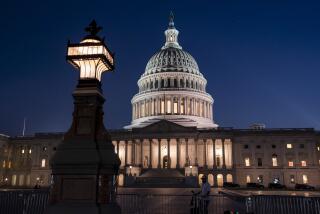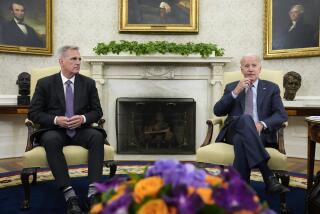It Took Public Heat to Make Senate Torch a Dirty Deal
- Share via
Secret deals to do costly favors for special interests are an odorous commonplace when tax legislation is written, and no deal in recent memory stinks more than the $50-billion break for the tobacco industry that was furtively inserted into the 327-page tax bill Congress approved and President Clinton signed this summer. The provision, a single sentence added to a section innocuously titled “Technical Amendments Related to Small Business Job Protection and Other Legislation,” was written by a tobacco industry lobbyist and inserted into the measure at the behest of the Republican congressional leadership and with approval from the White House. Shame on the leadership and shame on Clinton administration officials for conniving in this dirty deal.
The Senate, which had earlier voted 78 to 22 against repealing the tobacco industry tax break, has now come to its senses and voted for elimination, 95 to 3. What that means is that the tobacco companies will not be allowed to count the cost of the new 15-cent-a-pack cigarette tax against the financial exposure they face under their settlement agreement with 39 states. The agreement calls for the industry to pay $368.5 billion over 25 years to resolve civil suits and compensate the states for their smoking-related health costs. President Clinton and Congress have raised objections to a number of key provisions in this agreement, meaning that any final agreement almost certainly will have to contain language providing for a tougher federal role in regulating smoking.
The effect of giving the tobacco industry a tax credit would have been to force taxpayers to massively subsidize the payouts the cigarette companies face following the decades they have spent denying and deliberately hiding the truth about the terrible health consequences of smoking. Any such subsidy is simply indefensible. The deceptions practiced by the tobacco companies were not an ordinary business practice but were criminally irresponsible, as their own internal documents show, and the costs now to be paid should deservedly be punitive as well as compensatory. The Senate, under public pressure, has righted a wrong it ought never have committed in the first place. The House must do no less.
More to Read
Get the L.A. Times Politics newsletter
Deeply reported insights into legislation, politics and policy from Sacramento, Washington and beyond. In your inbox twice per week.
You may occasionally receive promotional content from the Los Angeles Times.










